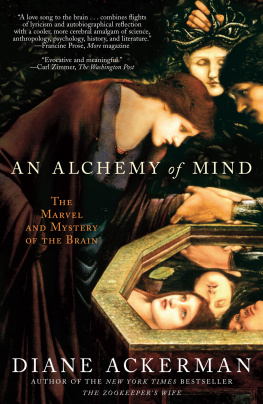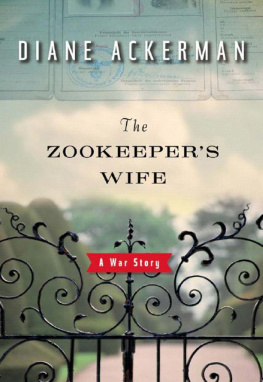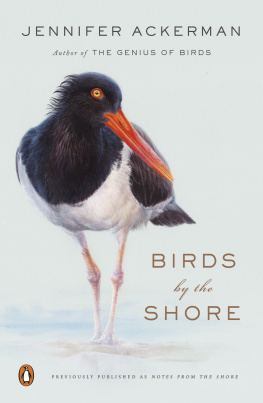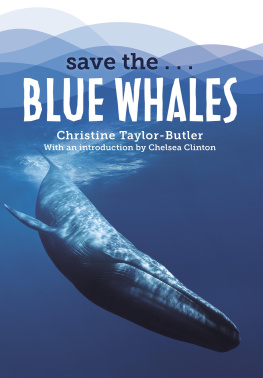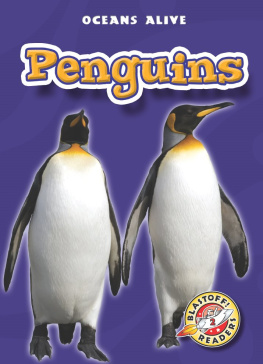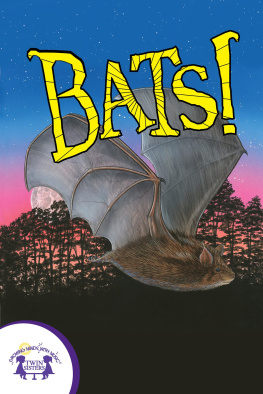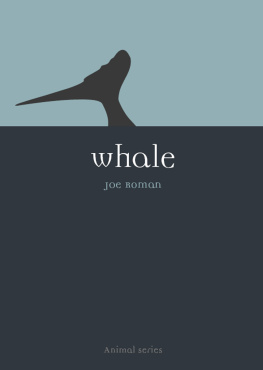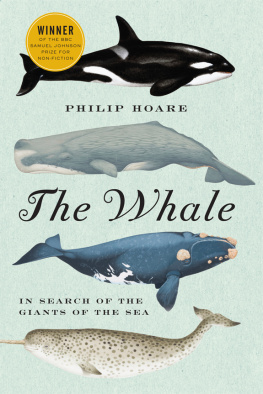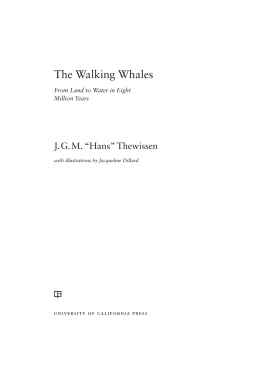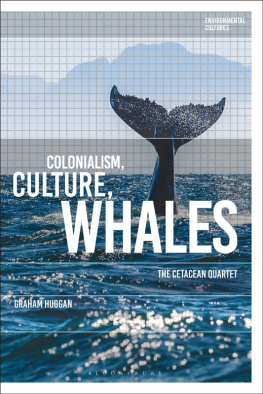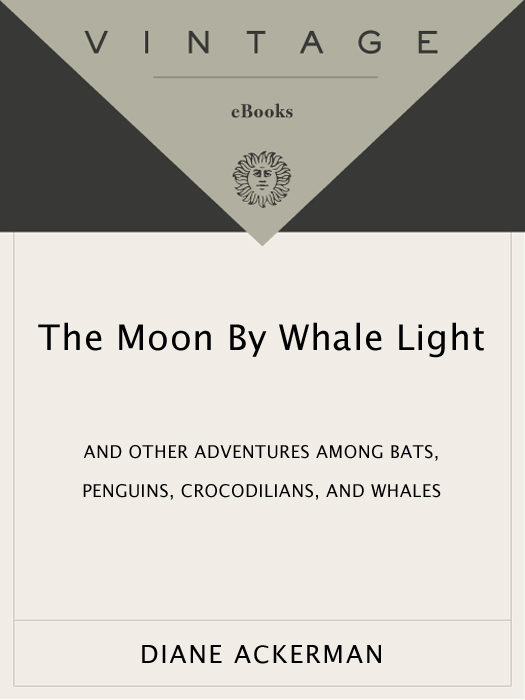PRAISE FOR
Diane Ackermans
THE MOON BY WHALE LIGHT
One of our most thoughtful and imaginative writers on natural history a stunning fit between science and art.
Houston Chronicle
Informative entertaining Ms. Ackerman has a gift for sparkling, resonant language, and her descriptions of various animals and their habitats are alive with verbal energy and delight fascinating.
The New York Times
Once in a while you forget, when reading Diane Ackermans prose, that youre reading nature writing. One becomes immersed in an essay, cruising along with this womans unfolding adventure. By mingling a narrative of her experience with the study of the lives of animals, she reminds us that not only she is connected, intimately, to the worlds of animals, we all are.
Detroit Free Press
The Moon by Whale Light is passionate, well-written journalism . Ackermans effervescent prose conveys the rapture she feels when engaging with another creatures being.
Cleveland Plain Dealer
ALSO BY DIANE ACKERMAN
Jaguar of Sweet Laughter:
New and Selected Poems
A Natural History of the Senses
Reverse Thunder
On Extended Wings
Lady Faustus
Twilight of the Tenderfoot
Wife of Light
The Planets: A Cosmic Pastoral
Diane Ackerman
THE MOON BY WHALE LIGHT

Diane Ackerman was born in Waukegan, Illinois. She received her B.A. from Pennsylvania State University and an M.F.A. and PhD. from Cornell University. Her poetry has been published in many leading literary journals, and in the books The Planets: A Cosmic Pastoral (1976), Wife of Light (1978), Lady Faustus (1983), Reverse Thunder: A Dramatic Poem (1988), and Jaguar of Sweet Laughter: New and Selected Poems (1991).
Her works of nonfiction include, most recently, A Natural History of Love (1994); The Moon By Whalelight and Other Adventures Among Bats, Crocodilians, Penguins, and Whales (1991); A Natural History of the Senses (1990); and On Extended Wings (1985), a memoir of flying. She is at work on a second book of nature writings, The Rarest of the Rare.
Ms. Ackerman has received the Academy of American Poets Lavan Award, and grants from the National Endowment for the Arts and the Rockefeller Foundation, among other recognitions. She has taught at several universities, including Columbia and Cornell, and she is currently a staff writer for The New Yorker.
FIRST VINTAGE BOOKS EDITION, OCTOBER 1992
Copyright 1991 by Diane Ackerman
All rights reserved under International and Pan-American Copyright Conventions. Published in the United States by Vintage Books, a division of Random House, Inc., New York, and simultaneously in Canada by Random House of Canada Limited, Toronto. Originally published in hardcover by Random House, Inc., New York, in 1991.
Portions of this work were originally published in different form in The New Yorker.
Library of Congress Cataloging-in-Publication Data
Ackerman, Diane.
The moon by whalelight: and other adventures among bats, penguins, crocodilians, and whales / Diane Ackerman. 1st Vintage Books ed.
p. cm.
eISBN: 978-0-307-76334-1
1. Animals. I. Title
QL81.A24 1992
591dc20 92-50004
v3.0
F OR MY PARENTS ,
M ARCIA AND S AM
ACKNOWLEDGMENTS
Shorter versions of these essays appeared in The New Yorker. Heartfelt thanks to Robert Gottlieb, its editor in chief, for sending me out on such nourishing journeys.
CONTENTS

INTRODUCTION

For a month in 1989 I sailed around Antarctica, a landscape as sensuous as it is remote, whose crystal desert I had wanted to see for a long time. Some months earlier I helped raise baby penguins in quarantine at Sea World in San Diego. One fluffy brown yeti-shaped chick, which I became particularly fond of, I named Apsley, after Apsley Cherry-Garrard, who in 1911 trekked across Antarctica, and wrote a vivid and poignant book about it, The Worst Journey in the World. For two years, I had been writing natural-history essays for The New Yorker, the magazine that sent me to see and write about penguins in the wild. To be haunted by the ghostly beauty of pastel icebergs and astonished by the Antarctics vast herds of animals is an experience few people have ever known or will ever know, and I felt privilegedand still do. Not so long agoin the days of Sir Richard Burton, T. E. Lawrence, D. H. Lawrence, Lady Hester Stanhope, Beryl Markham, Herman Melville, Washington Irving, and othersthere was a crossroads where physical and literary adventure converged. There is also a long history of the bards called nature poets, and this brimming category includes writers as different as Lucretius and Marvell. But my prose now seems to locate me among a small tribe often referred to as nature writers. How curious that label is, suggesting as it does that nature is somehow separate from our doings, that nature does not contain us, that its possible to step outside nature, not merely as one of its more promising denizens but objectively, as a sort of extraterrestrial voyeur. Still, the label is a dignified one, and implies a pastoral ethic that we share, a devotion to the keenly observed detail, and a sense of sacredness. There is a way of beholding nature that is itself a form of prayer.
In my Antarctic journal I wrote: Tonight the moon is invisible, darkness itself has nearly vanished, and the known world, which we map with families, routines, and newspapers, floats somewhere beyond the horizon. Traveling to a strange new landscape is a kind of romance. You become intensely aware of the world where you are, but also oblivious to the rest of the world at the same time. Like love, travel makes you innocent again. The only news Ive heard for days has been the news of nature. Tomorrow, when we drift through the iceberg gardens of Gerlache Strait, I will be workingthat is, writing prose. My mind will become a cyclone of intense alertness, in which details present themselves slowly, thoroughly, one at a time. I dont know how to describe what happens to me when Im out in nature and workingits a kind of rapturebut its happened often enough that I know to expect it.
I had been wondering then about the little penguin Apsley. Soon he would have fledged, replacing his thick brown down with black and white feathers, and would look very different. My plan was to gather pebbles from the rookery at Salisbury Plain, on South Georgia (where the egg he hatched from was collected), and take them back to him as a souvenir. Apsley was not the sort of penguin that builds nests from stones, but he might recognize the rich amalgam of smells.
Because I write at length about little-known animals in curious landscapes, people often ask, for example, Do you prefer whales to bats? I prefer life. Each of the animals I write about I find beguiling in and of itself; but in all honesty there is no animal that isnt fascinating if viewed up close and in detail. I chose to write about bats, crocodilians, whales, penguins, and such because each would teach me something special about nature and about the human condition: about our terror of things that live by night, or the advantages of cold-bloodedness; about intelligence and music, or our need to withstand most any ordeal to behold a nearly extinct life-form before it vanishes. Before beginning each expedition, I knew some of my motives, but I always returned nourished by unexpected experiences. What is necessarily missing from the essays is all the fun, turmoil, stress, and welcome obsessiveness that went into setting them up. The emotional marginalia sometimes included acts of great generosity of spirit, and at other times revealed less becoming sides of human nature.


